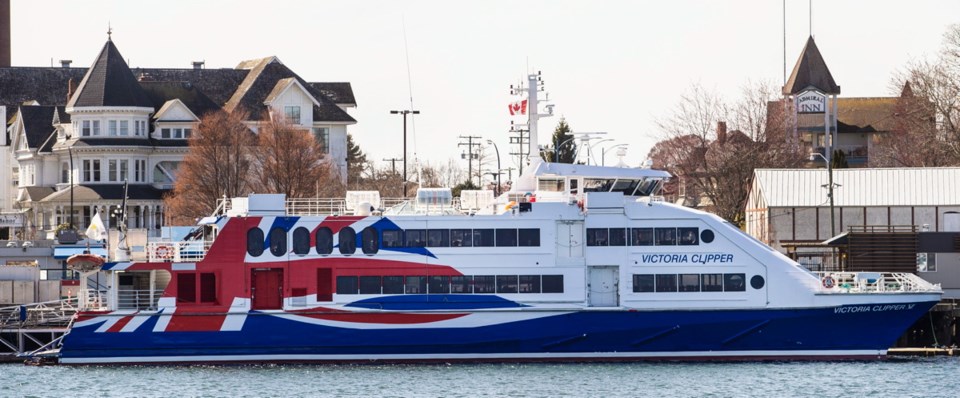When it’s open we’ll be ready. That was the message from transportation companies Tuesday, following the federal government’s decision to extend the ban until June 21 on non-essential travel between Canada and the U.S.
While tourism industry insiders suggest June 21 is a highly optimistic date — Destination B.C. has suggested this fall is the best-case scenario for travel between the two countries to restart, while some believe it won’t happen until next summer — the companies that bring visitors to Victoria from the U.S. say they will be ready.
“While the business impact continues to be dramatic, we’ll be ready to return to service as soon as the border re-opens and Vancouver Island is prepared once again for non-essential travel,” said David Gudgel, chief executive of the Clipper, which offers passenger service between Victoria and Seattle. “In the meantime, we are continuing to revise and prepare our operation plans for a safe and healthy return of crew, staff and customers.”
For now, Clipper has reset its projected return-to-service date to July 3.
Clipper vice-president Scott Meis said while they would be operationally ready to go as soon as the border is open, they have a series of criteria that will need to be met first, including having an open border, customs services in place and an end to the 14-day isolation requirement for non-essential visitors.
“We are not going to be bull-headed and run the service if consumer demand remains low or our destination partners and locals are not ready to welcome back guests,” he said. “Our goal is not to run an empty boat back and forth simply because we are legally allowed to do so.
“Given the rapid changes happening daily with COVID and associated regulation decisions on both sides of the border, we’ll continue to adjust our target restart date based on making the best decision on the data and guidance we have at the time.”
Black Ball Ferry, which operates the Coho car ferry between Victoria and Port Angeles, has not put a date on its projected return, but said it would be prepared to get back in the game when the border opens.
Ryan Malane, vice-president of Black Ball, said they have already suspended all sailings in June and will wait until they get the green light to operate from governments on both sides of the border.
“We are not going to operate for leisure travel until the provincial and federal authorities have said it’s safe to do so,” he said.
Paul Nursey, chief executive of Tourism Victoria, said the focus of Victoria’s tourism industry is to salvage what it can from a domestic market this year and try to remain intact for 2021.
He said he’s hopeful the border will open sooner rather than later, but the industry will take the lead from health-care experts and government.
“The federal government needs to do what it deems to be safe,” added Geoff Dickson, chief executive of the Victoria Airport Authority. “Once they determine that the border is safe to open for all forms of travel, we will be ready to service trans-border flights.”
Dr. Theresa Tam, the country’s top public health official, said there is a need to keep borders closed and concentrate on ensuring the domestic situation is well in hand before welcoming outside visitors.
“We have to cautiously lift measures within our borders first, just to see slowly what actually happens,” she said Tuesday. “We will want to see that cases are still suppressed. We’re still going to manage, detect and clamp down on any new spots that might come up.”
Canadian and American officials mutually agreed to the extended closure, which prohibits discretionary travel while permitting trade shipments, commerce and essential workers to flow in both directions.



